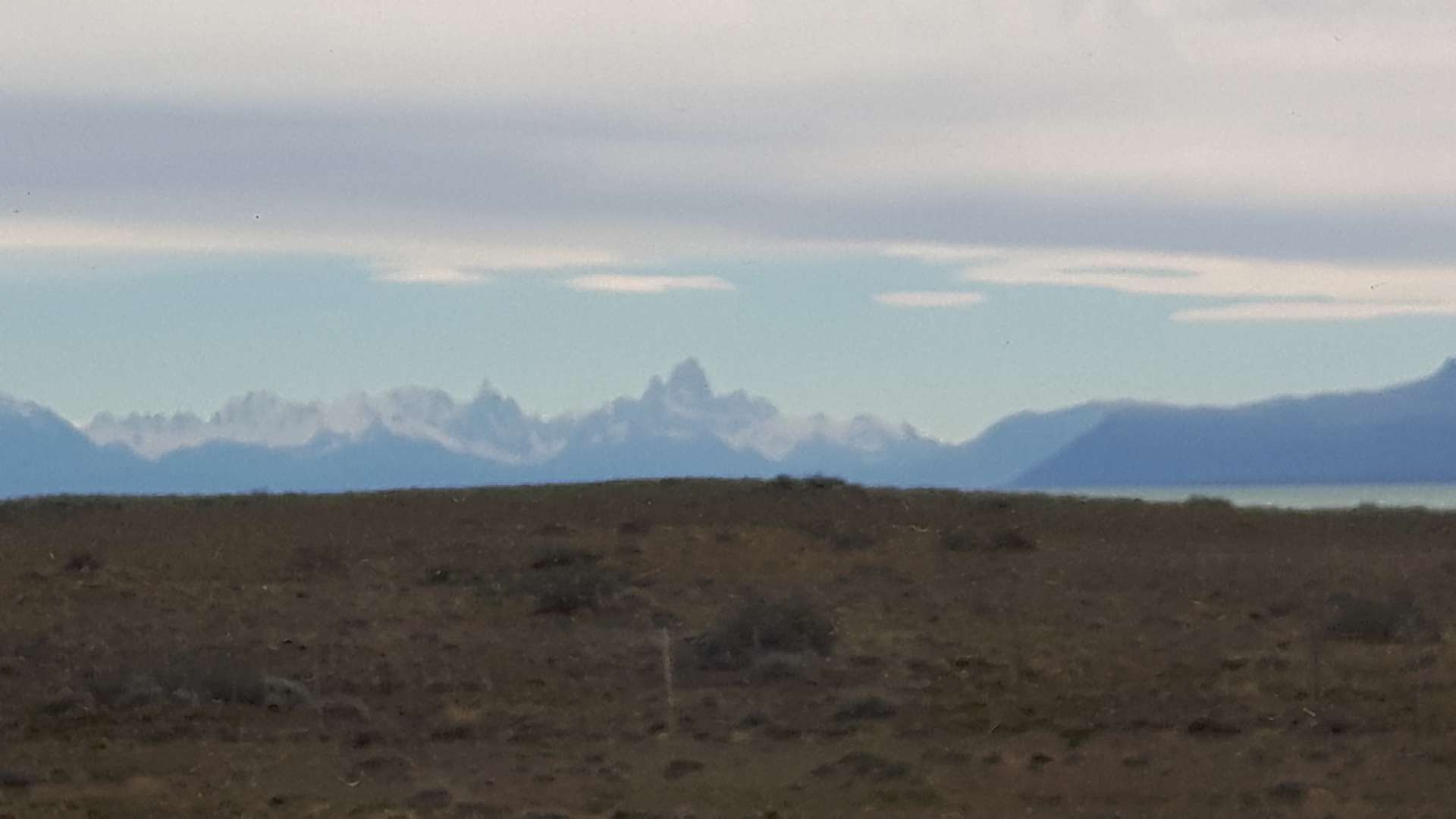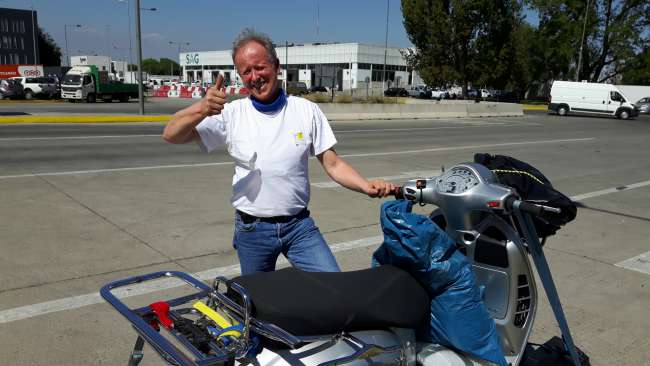ab 21.01.: Pomerode / SC
بڵاوکراوەتەوە: 22.01.2019
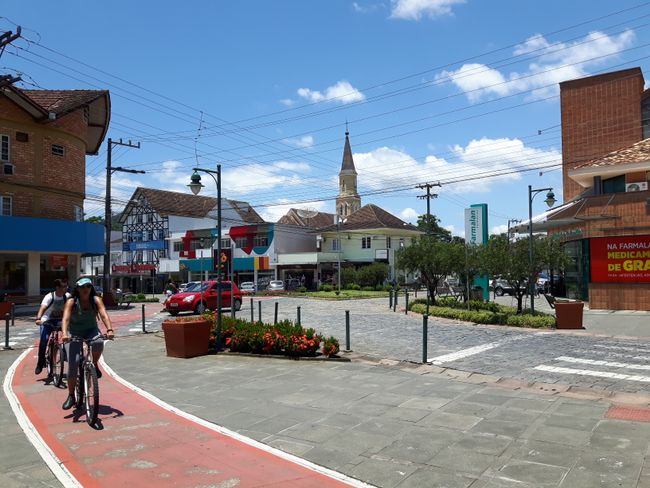
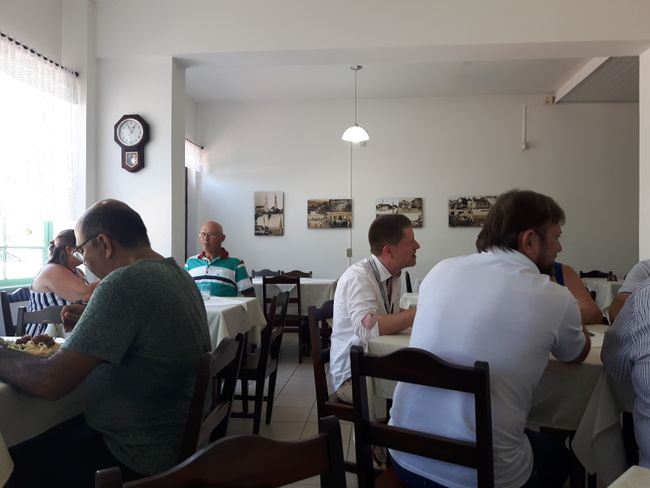
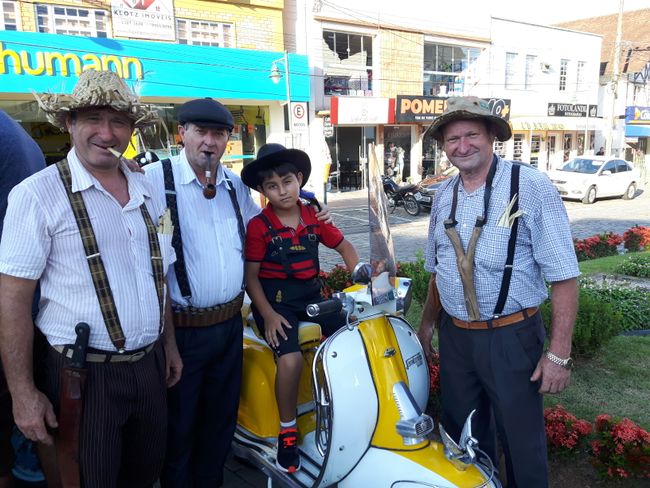
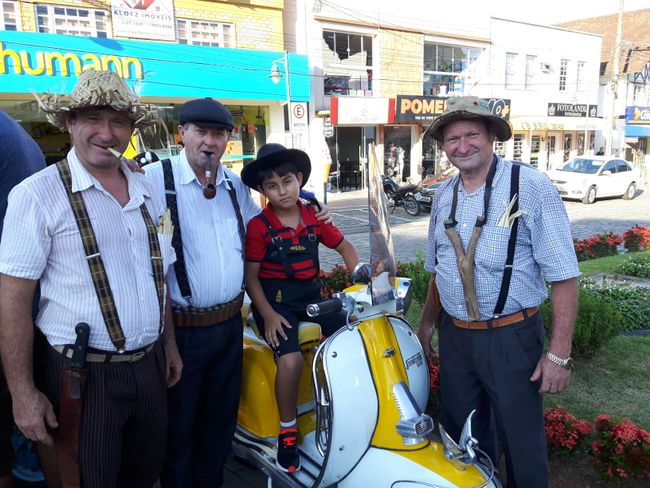
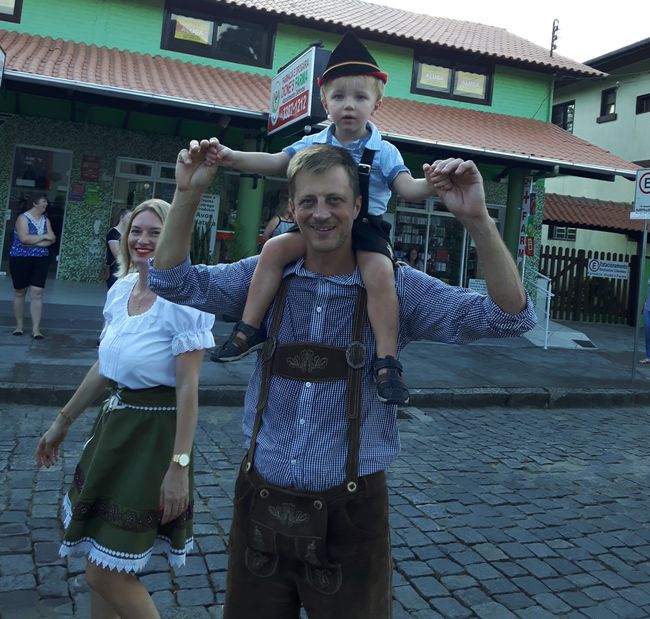
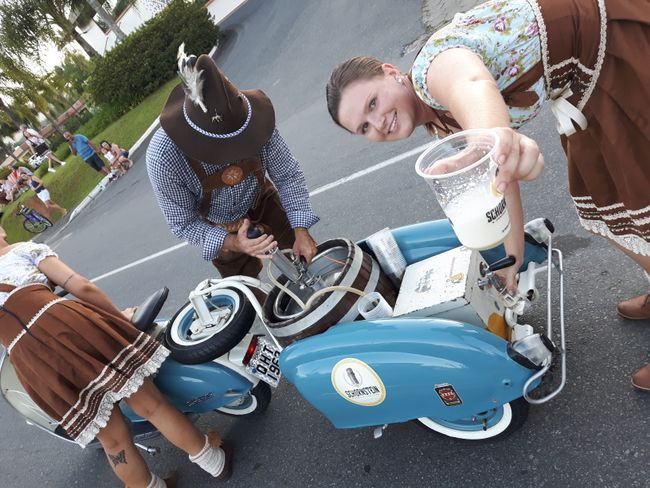
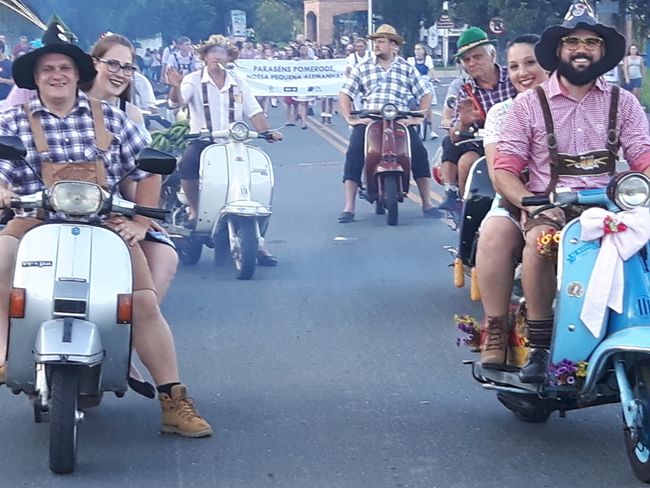
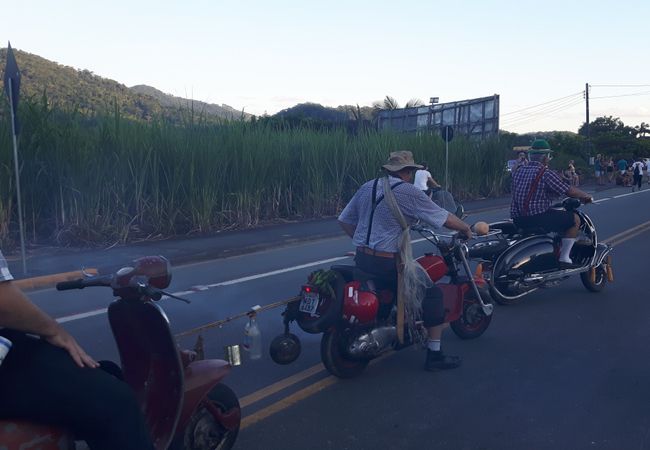
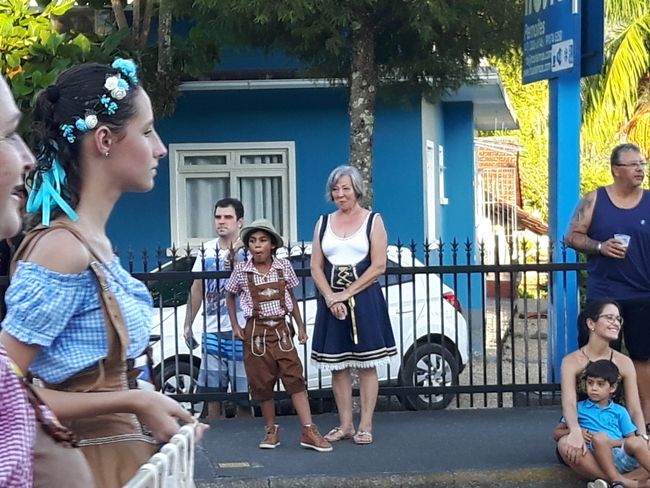
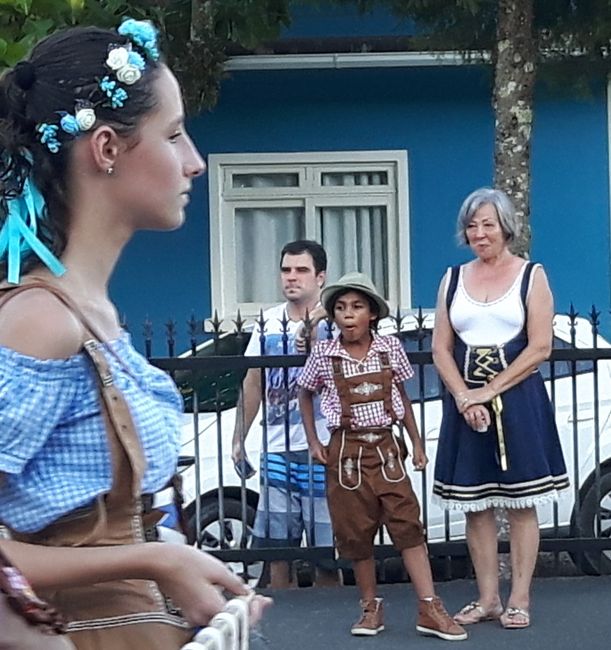
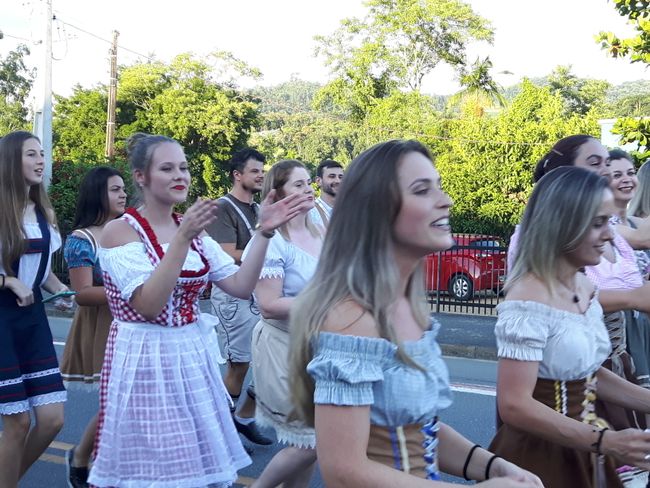
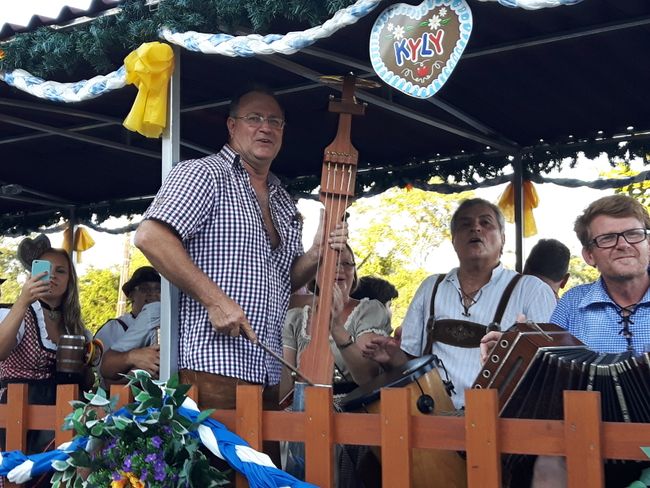
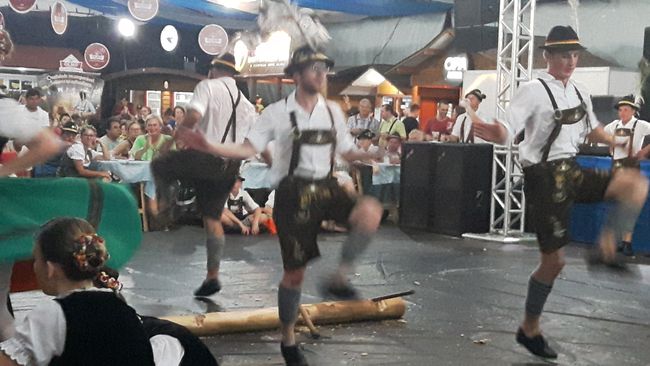
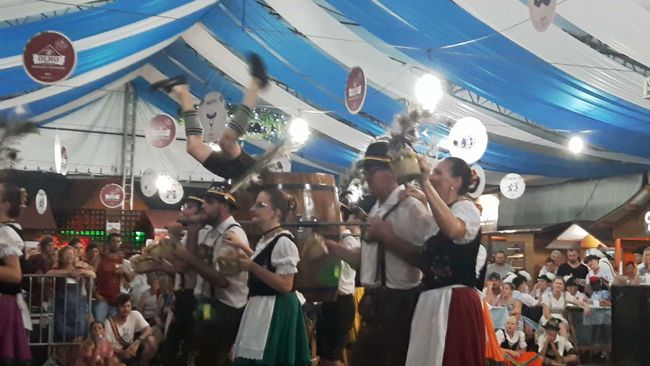
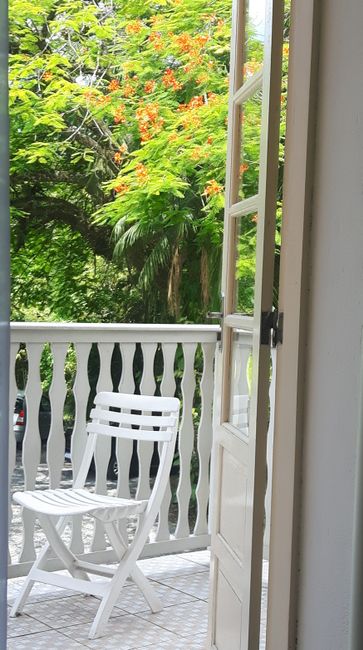
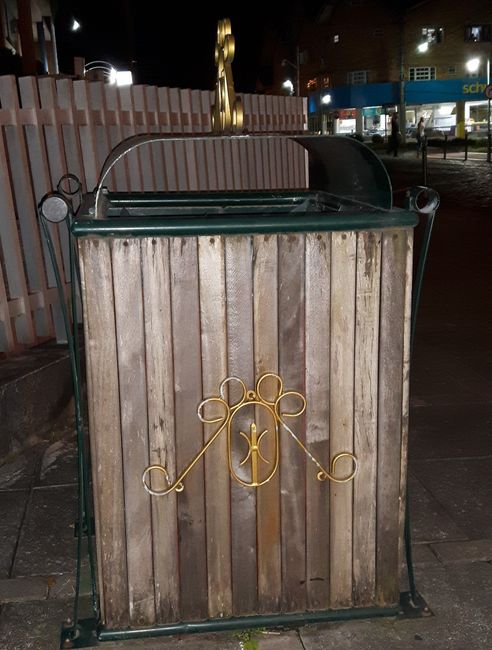
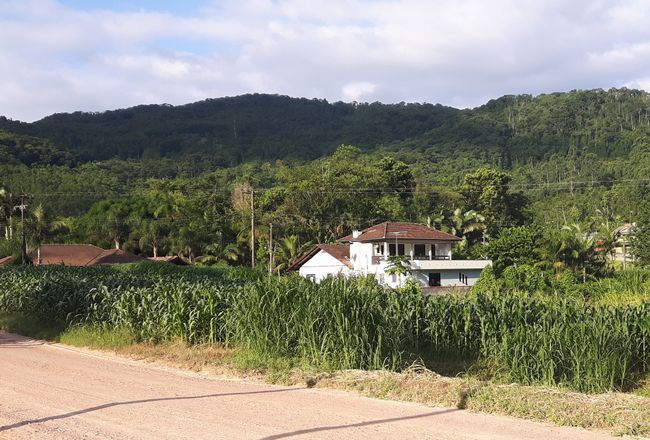
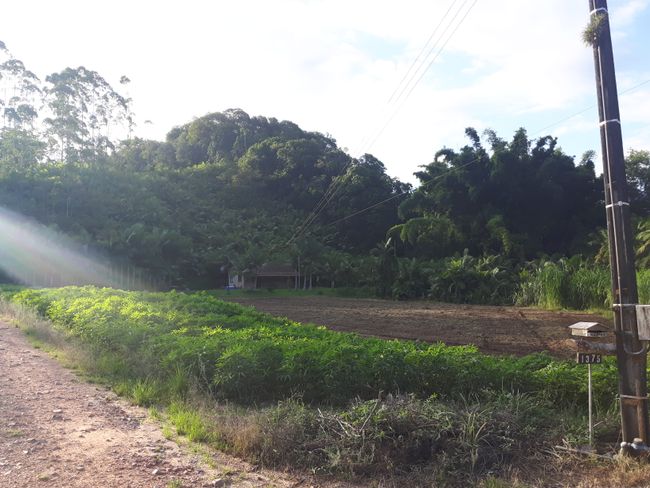
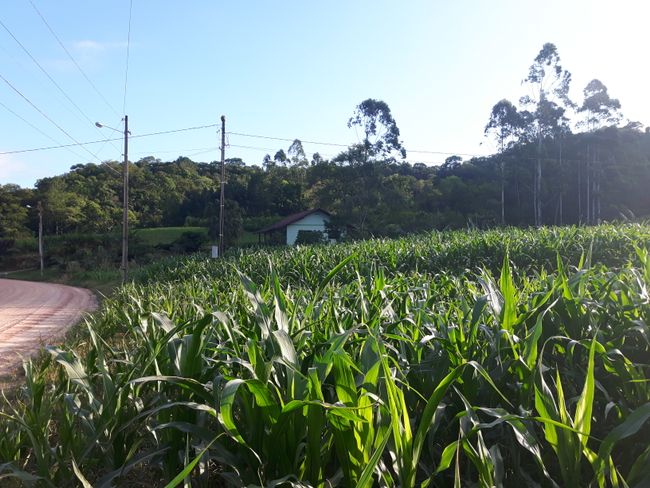
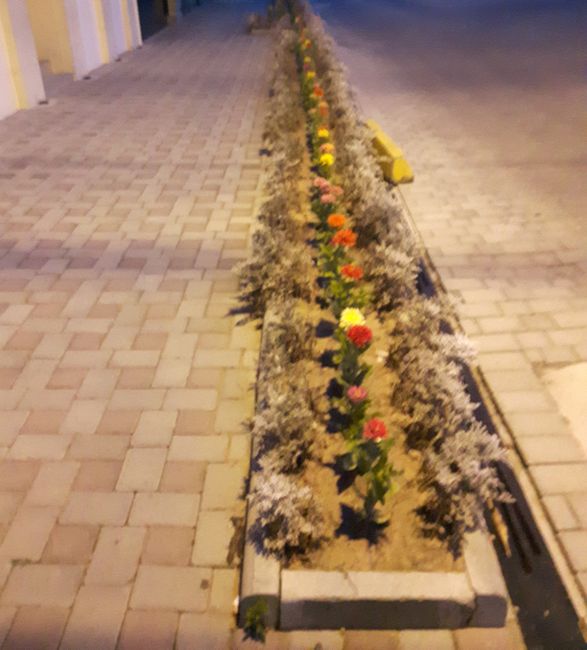
سەبسکرایبی هەواڵنامە بکەن
21.01.:
Yesterday, my hostel owner led me to the street in front of his house. At first, I didn't know what he wanted from me, but then he showed me a hole in the road and a broken plastic pipe through which the water from the mountains was gushing out with high pressure, like a fountain. He emphasized, this is clean water! He has already placed several of these octagonal paving stones to control the flow so that it does not erode the rest of the steep road. My first thought was a plumbing emergency, the police, or the fire department. The answer was simple: vacaciones, an extended weekend. And he added, this is Brazil...
Maybe being brought back to the present in Brazil was good for me. Because in the past two days, I have been wondering from time to time, why do they all speak Portuguese? We are in Brazil - not in Rinteln or Bayreuth.
Forget about it. Continue heading south. Leave Santa Catarina and come back to South America! That's why you're here. You have had enough of Germany when you return. But you do like Bavaria..., comes back hesitantly.
But then there is Pomerode. The Brazilians pronounce it as "pomerodschi". And it is a small town with maybe 30 thousand inhabitants. And the article "Pommern unter Palmen" has suggested to me that it is different there than in Blumenau, that the German tradition is lived in everyday life, that there is still - albeit on a voluntary basis - German lessons in schools.
Pomerode, which is located in the European valley, is only 30 km away from here. I decide to spend a night there. Half a day is enough to get an impression. Then just get away...
That's the plan...
I was a bit worried about my departure. Should it be as complicated as my arrival here? Before the hostel owner led me to the hole, I asked him if he could get his car out of the garage on Monday morning. That would make it easier for me to pack up the scooters. Of course! So today's departure is not a problem.
Meanwhile, the fountain has dried up and a 70-inch connector piece has been installed. This is also an interesting phenomenon in South America. The installed pipes have exactly this diameter. Not 100 or 110. This leads to the fact that there is a bucket next to every toilet - with a bit of luck with a lid. The pipes would immediately clog hopelessly if the paper was not thrown into the available bucket.
Getting used to it at home - after my first return - was already a certain challenge. There was no bucket...
Clear sky. Some wind. The temperatures are still below 30 degrees. The breakfast corresponds to the price of the hostel and is always the leftover from the previous day... but when the white bread is toasted, it dominates the taste of margarine. At least the coffee is hot.
I am currently immersed in the world of Sebastian Fitzek, who captivates me with his psycho-thriller, in the Brazilian and German world. Either I delete the book from my reader and focus exclusively on this world - or I let myself be captivated. I can't get away from him.
I have time, I think. I will reach my destination in maximum two hours and while I drink my no longer hot coffee, I go to the pathology and the forensic pathologist who seeks revenge...
But then I tear myself away, pack up, top up oil and petrol, and set off. The road is stable and not completely undermined by the water masses.
It is not the Holstentor that I pass through when I arrive in Pomerode, but I am reminded of it.
Cobblestone streets, bungalows with mowed large lawns, freshly plastered two-story houses with balconies and Bavarian-style roofs with large overhangs. Even the lawns in playgrounds and parks are trimmed, and even the trash cans have a unique design with wrought iron elements, and cyclists have their own, red-painted lane on the sidewalks.
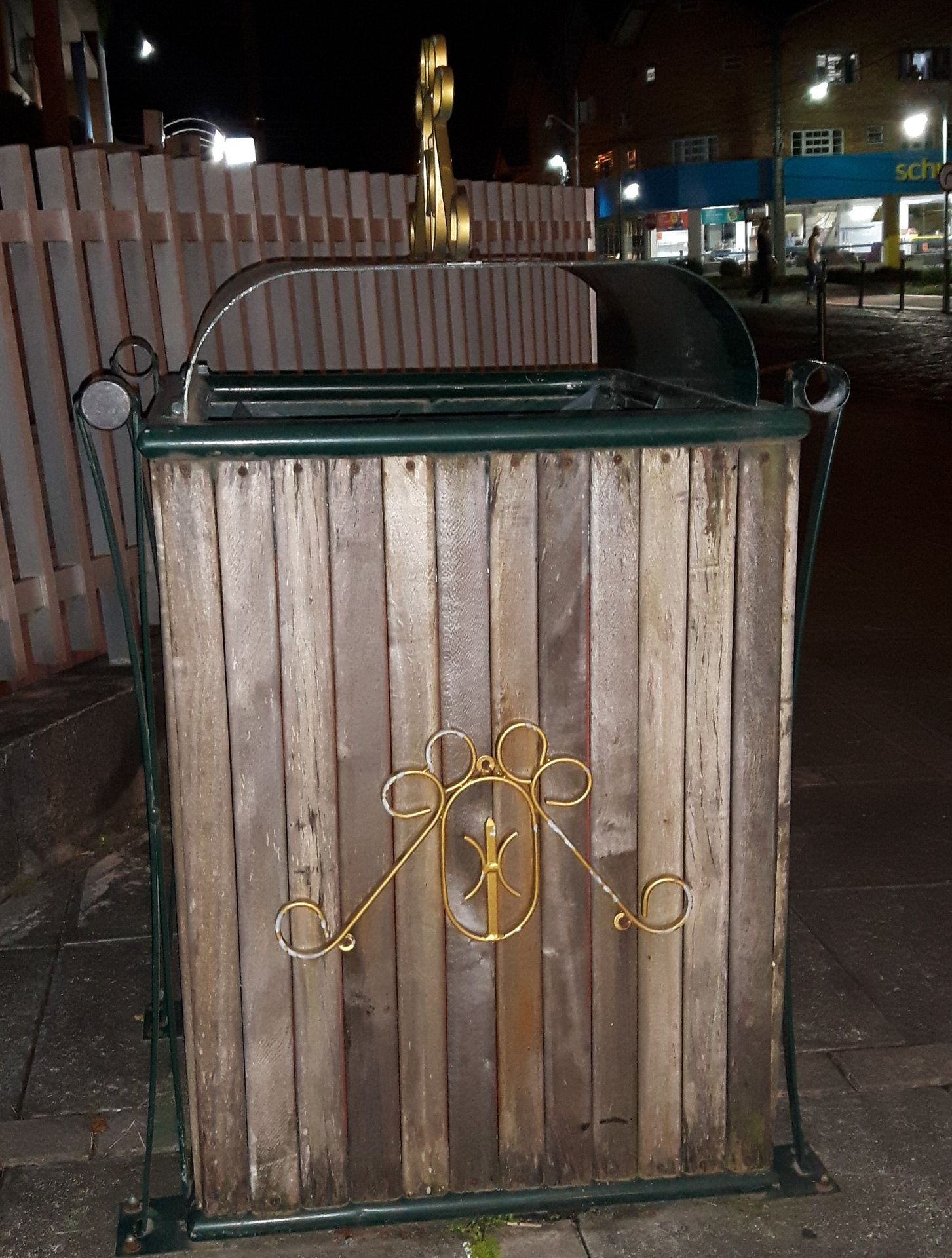
German perfectionism
I pass by a confectionery shop called "Tortenparadies", a chocolate store, I come across the "Wunderwald" and I am curious and want to have lunch there, but I am deterred by waiters wearing lederhosen, so I continue and finally arrive at Schroeder's restaurant. A very well-kept house, reed green plaster with white window frames. There is a parking lot "only for guests" in the courtyard. Although I am not hungry yet, I know that if I don't eat now, I will have to do without healthy food for the rest of the day.
When I enter the dining room, I have traveled more than 10,000 km in seconds and find myself in the Bavarian town of Rosenheim.
Tables for four and six people with white tablecloths and table numbers, their wooden covers decorated with edelweiss motifs. Still lifes with flower arrangements and black and white photos from the time when everything started at Schroeder's hang on the walls.
I find the buffet as in any "cantinha". And also here, it is rich with everything your heart desires. Here, they even have Swabian potato salad and for dessert, vanilla pudding with mirabelle compote!
What is not available in Rosenheim is freshly squeezed lemon juice. While I indulge at the buffet, I overhear snippets of conversation that bring me back to the cozy Rosenheim atmosphere. I hear German words. Whole sentences and even a conversation. Some Bavarian is also mixed in.
I sit down at my table, am only briefly looked at, and order my lemon juice in German. But before that, I ask if the waiter speaks German. He replies with a throaty aber sicher.
Where am I?
The men's club talks about the weekend and the experiences during the Pomerode summer festival. They are not tourists. When three of them get up, the question comes: do you still have to work?
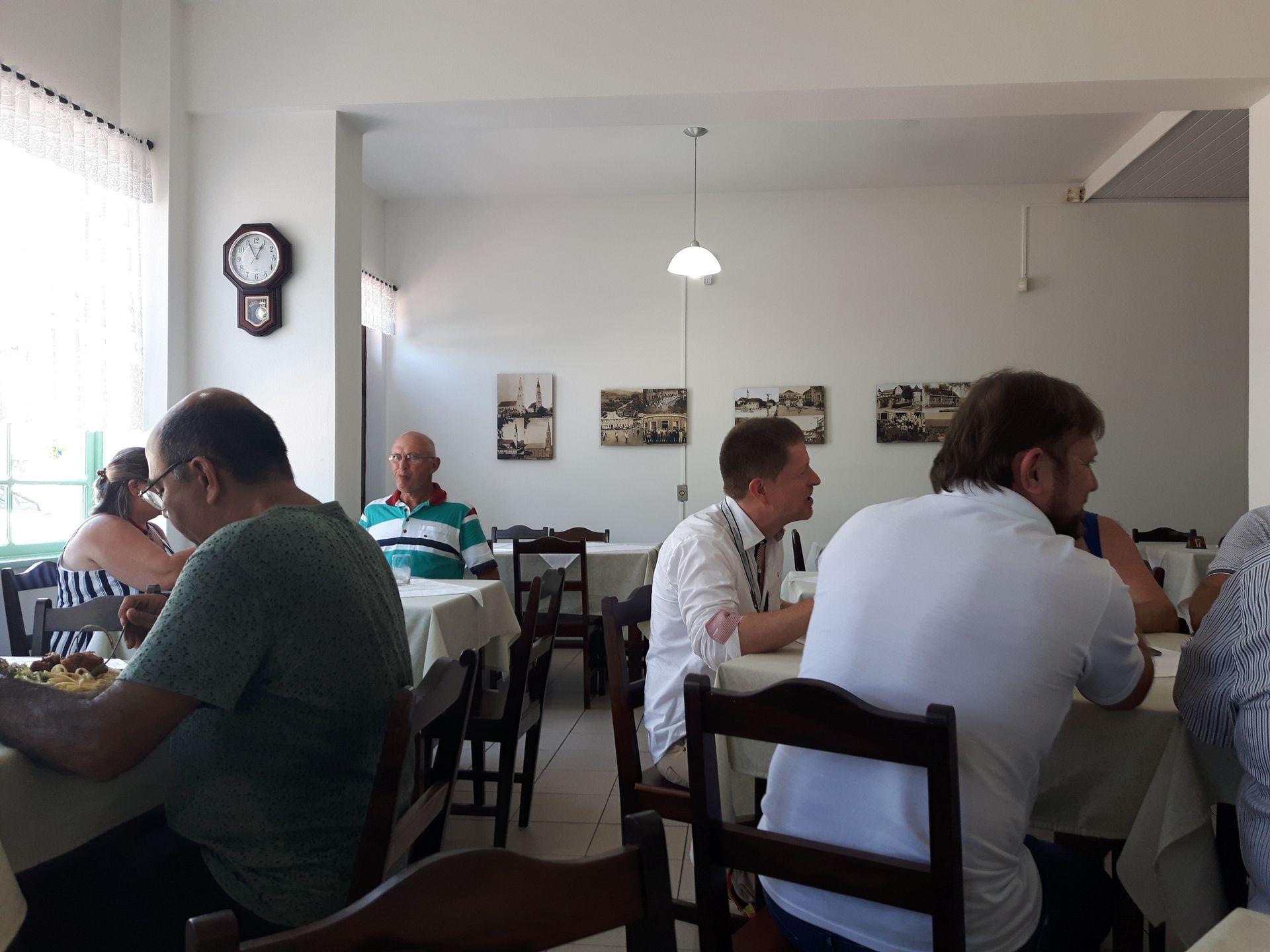
I pay later and already feel somewhat relieved as I am allowed to leave Rosenheim.
Even the gas station attendant, whom I ask for directions to my hostel, answers me in German. Doesn't it stop? I think to myself.
A conflicting feeling: on the one hand, a feeling of coming home, but on the other hand, an unwillingness that it is still too early for the feeling of coming home.
When I reach my hostel, I suddenly find myself in the capital of Baden-Württemberg. Not in the Kessel, but on the outskirts with a view of Pomerode. The wrought iron entrance gate opens automatically when I press the doorbell, which is embedded in a high, ochre-colored wall. In front of me spreads a silver-gray, sparkling gravel that my 12-inch wheels have great respect for. How quickly they can deviate from the track. The house is very well-kept, with white mullioned windows and patio doors, also painted in ochre, and with a balcony. The lawn is dark green and freshly mowed. I can see a swimming pool somewhat blurred.
The hostel owner is maybe in his late sixties and has been in Pomerode for 20 years. At second glance, I notice that he also has his law firm here. He specializes in criminal, civil, and labor law, and runs the hostel as a side business. It bears the telling name 'Paradise' - not paraiso...
Actually, I already know that one night is not enough.
22.01.:
Change of scene.
I have been here for barely 24 hours and the acclimatization process is almost complete.
Pomerode welcomes me with open arms and seems to say, we will not let you go so quickly.
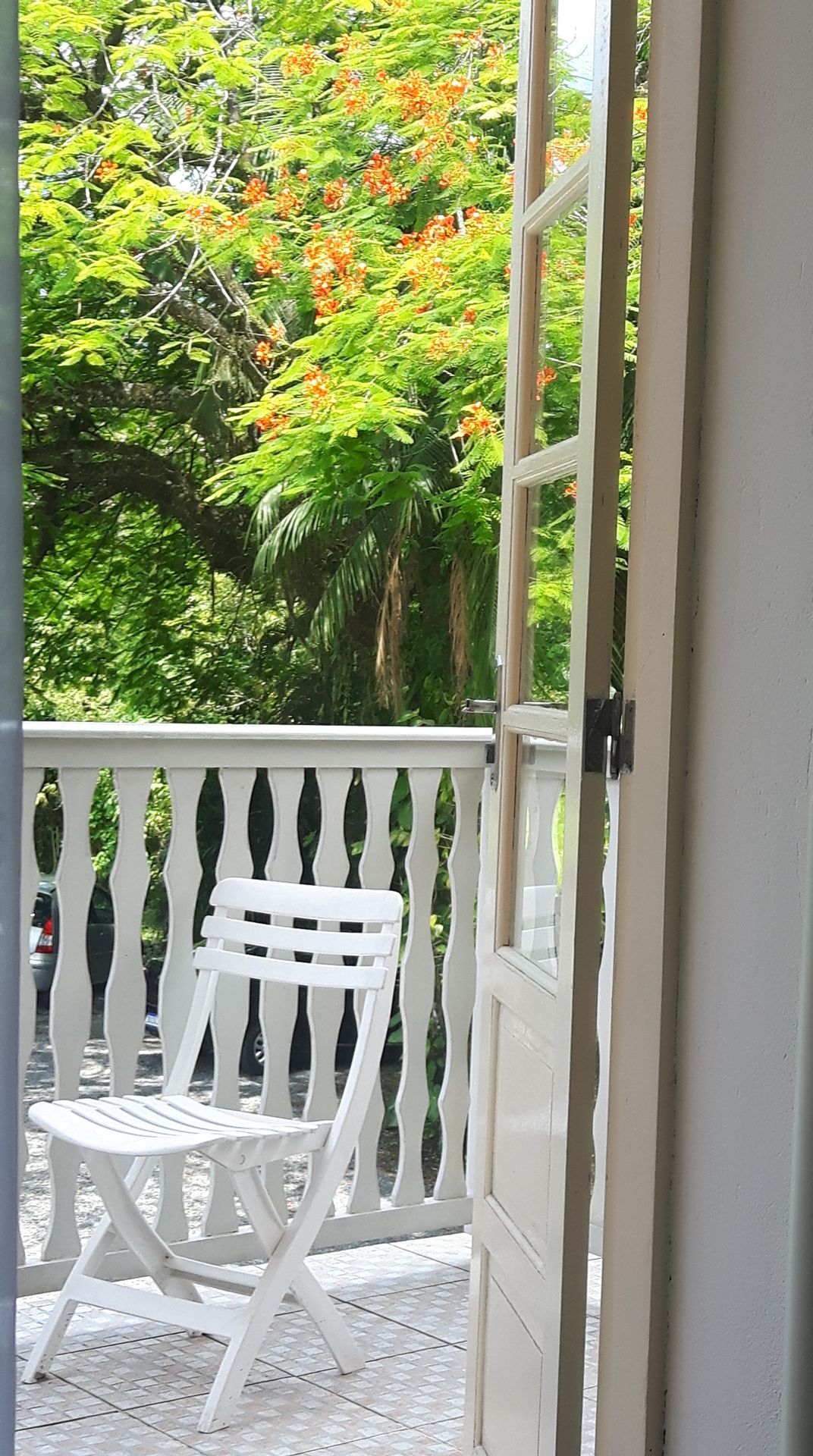
Pure luxury!
Antonio, my hostel owner, informs me this morning that my room is already booked, makes two phone calls for me, and just half an hour later, I find myself in Pousada MAX. A house from the late 1920s. It used to be a pharmacy. Dark wooden floors, high ceilings, a spacious staircase, a narrow staircase with worn steps. My room has a window and a balcony door that actually leads to a balcony overlooking the garden. A spacious bathroom - also with a window! I have booked 2 nights for a whopping 28 euros per night! Who could say no to that and go straight to Rio do Sul?
Flashback:
After a siesta in Antonio's peaceful house, I am drawn outside. On a traffic training ground (!), not far from the house, a learner driver is doing her rounds.
Although the sun is scorching, curiosity cannot be restrained. It's half past four. Although it is still way too early for it, I feel like having a draft beer from the local chimney brewery. Blumenau has its Eisenbahnbier and Pomerode has its Schornsteinbrauerei.
I eventually leave the main street and expect the South American reality in the side streets, but I am mistaken. Mowed lawns, well-kept gardens and houses, balcony railings with plants and geraniums that are still at the beginning of their bloom.
A colorfully decorated horse-drawn carriage passes by me.
A little later, when I have my beer in front of me, an old, highly polished Ford truck drives by and several vintage jeeps.
Is it a wedding? But then I remember that today is the last day of the Pomerode summer festival. Maybe a parade?
I pay and let myself be guided to the 'Pavilhão de Cultura'. I quickly realize that I am on the route of the festival parade.
And then I notice a Lambretta. One? Definitely 3 or 4, and also two Vespa scooters! One with a trailer, on which a beer keg stands, which is connected to a foot pump for freshly tapped beer.
The members of this Vespa club do not wear lederhosen, but they have to wear checkered shirts. I get into conversation with two older Vespa riders who tell me the most amazing stories about sawed motor blocks so that a larger cylinder can be installed. Now it goes 140 km/h!! Both speak German well, and as it often happens, they talk more than I do.
We have to smoke here, my conversation partner, who holds an old-fashioned pipe between his lips, explains to me. Whether pipe, cigar or cigarette. It has to smoke.
But to the extent that I could understand, they will tell their other buddies about my journey through South America. I show them my blog and some photos of the fully packed scooters. I don't get much response. That might be because the vocabulary for questions etc. is not sufficient?
Compared to their great-grandfathers, my scooters are still green behind the ears. That would be it, if I quickly fetched them and joined the convoy. The permission depends on a shirt and suspenders. If I had something like that, I could join. Without it, it is simply not possible. Does this hint of German bureaucracy and narrow-mindedness shimmer through?
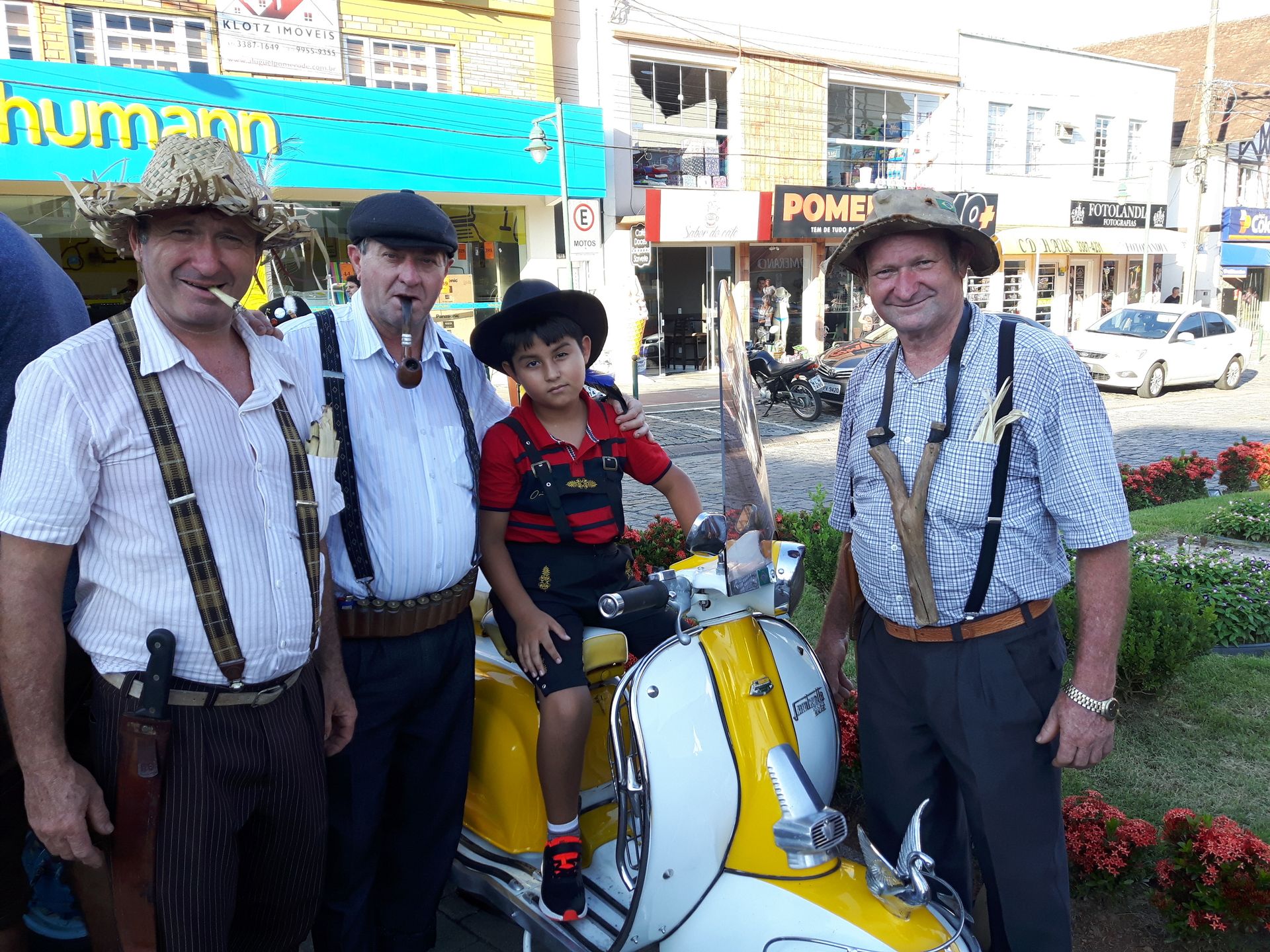
Surely I would also be missing the matching headgear
It's 7 pm. The train sets in motion. I rush ahead to have a good view of the Vespas upon their arrival.
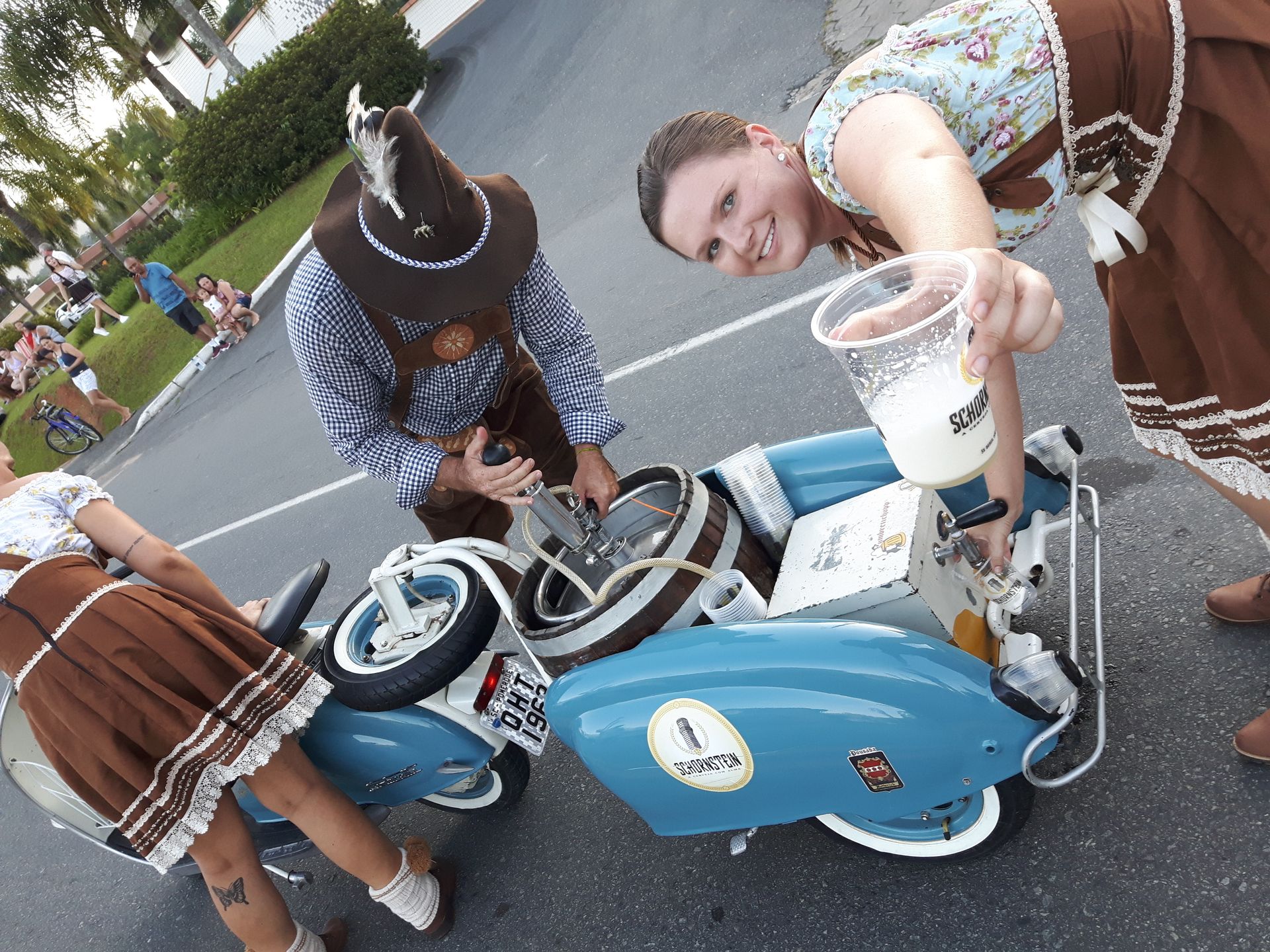
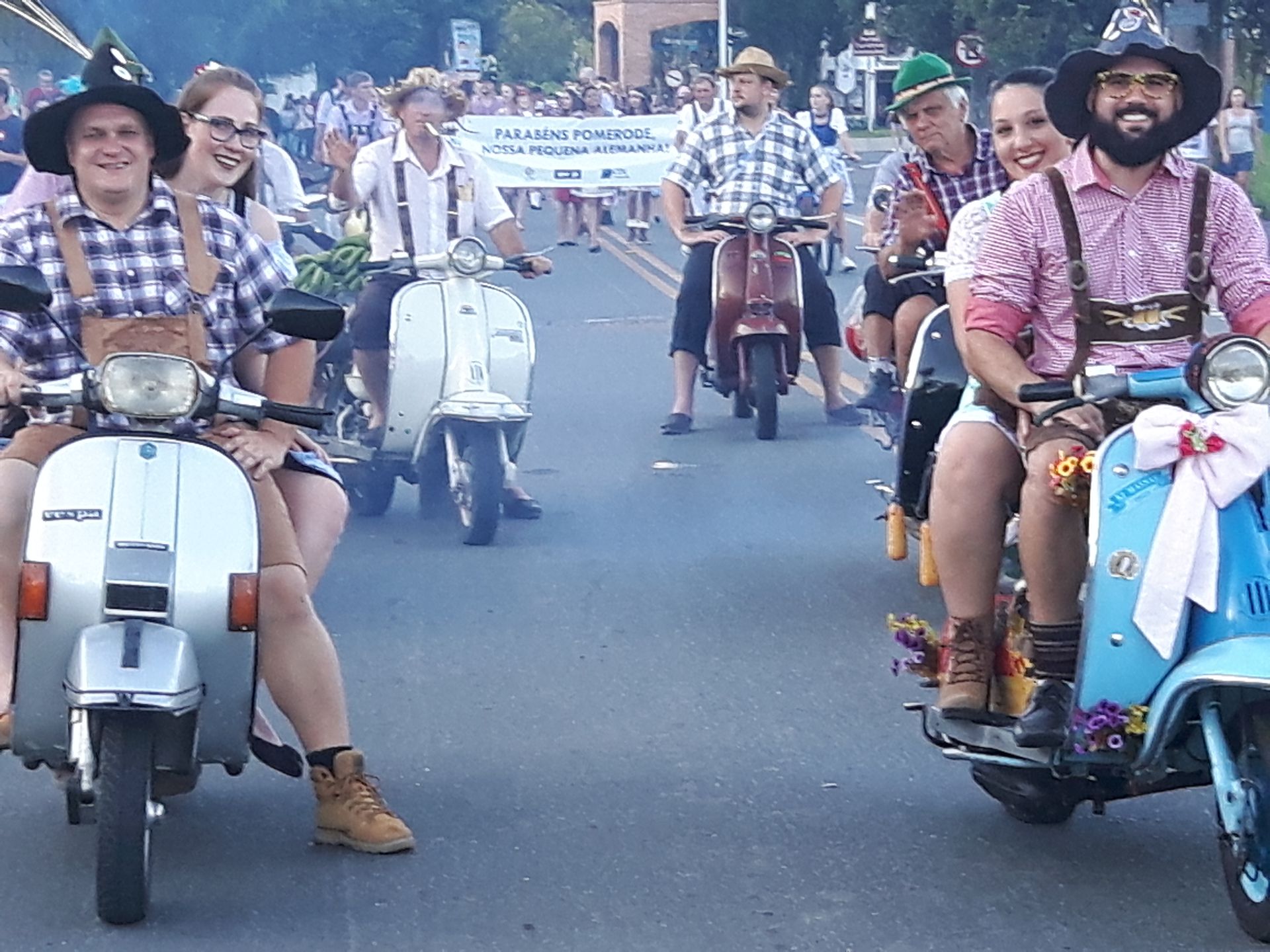
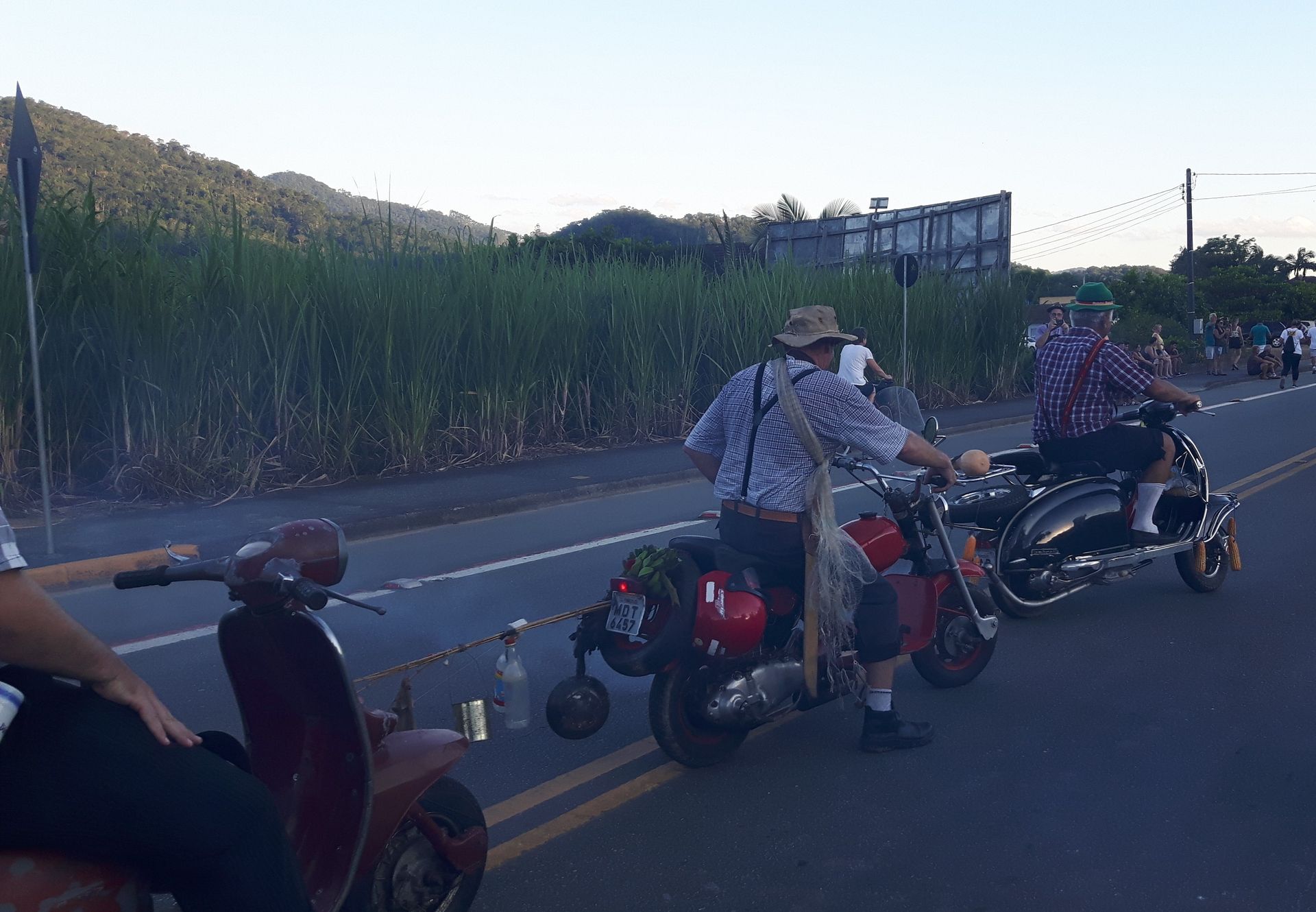
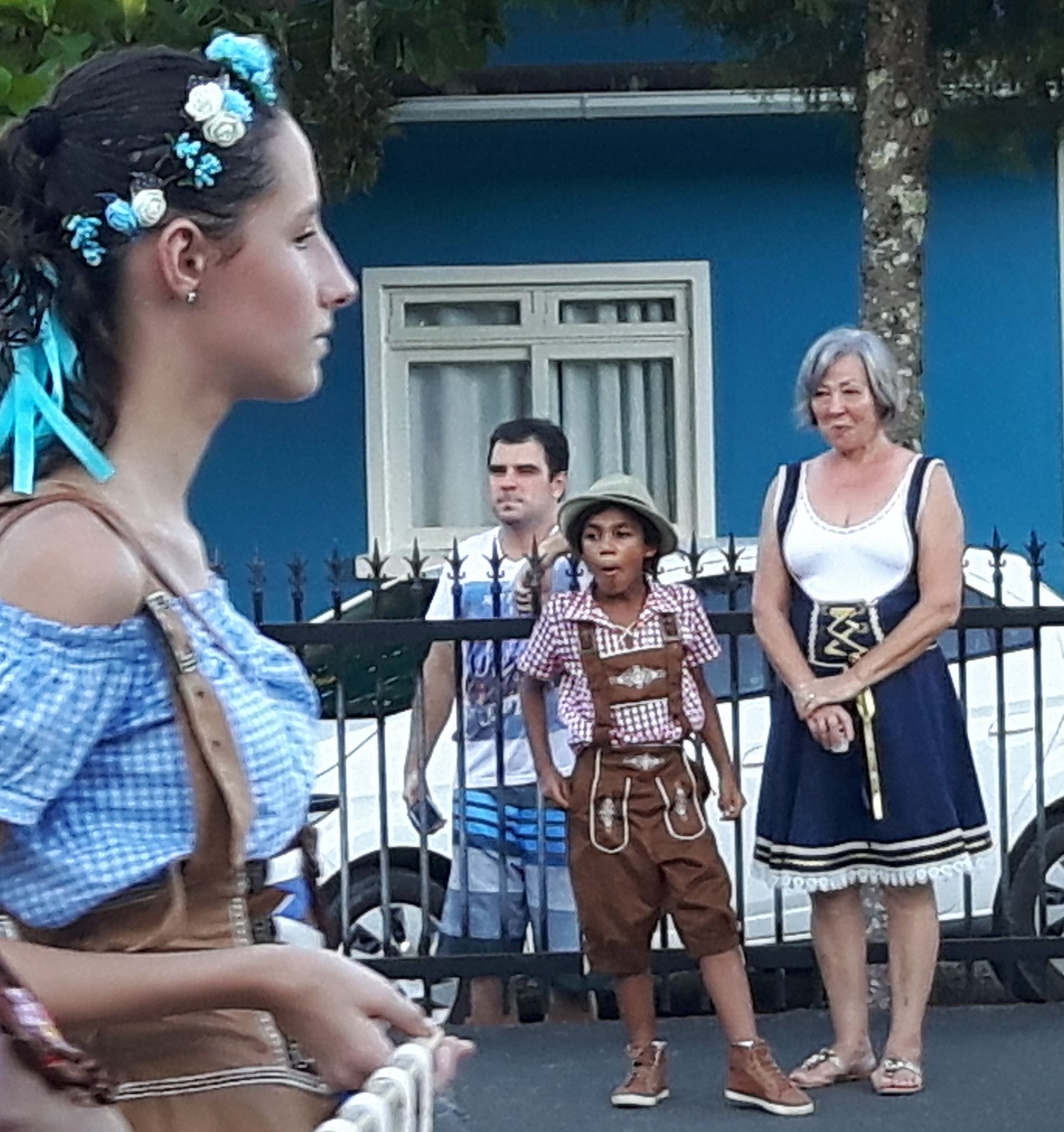

The Bavarian tradition continues

The stringed instrument is called a Teufelsgeige here
Soon I find myself at the entrance to the fairground. I suspect that I need an entrance ticket and I get in line until I reach the ticket office, but I am immediately stopped by a security guard. Also fair-skinned and dressed in checkered shirt and lederhosen. He signals to me that it's a no-go and I understand that entry will only be granted when the parade has arrived. I am jostled around and then a chain of security personnel forms to be prepared for the onslaught of the crowd rushing onto the grounds. I wade through and only get a small piece of paper in my hand. I don't have to pay for admission...
Then I discover a ticket booth and quickly realize that here you can buy vouchers for the beer. A beer costs the equivalent of 2.50 euros! There are food stalls that offer German cuisine. I choose spaetzle and fortify myself. Then it's into the hustle and bustle. The high roof is adorned with blue and white garlands. There are several stages and dance floors. Now lederhosen, checkered or white shirts, woolen socks, and dirndls in various combinations dominate. I notice that there are very few typically Brazilian faces. But when I spot them, they are just as caught up in the Oktoberfest hustle and bustle as their German counterparts. Because nothing else is happening here. It's a little Oktoberfest that competes with Blumenau. The Pomerodians maintain the German-Bavarian tradition.
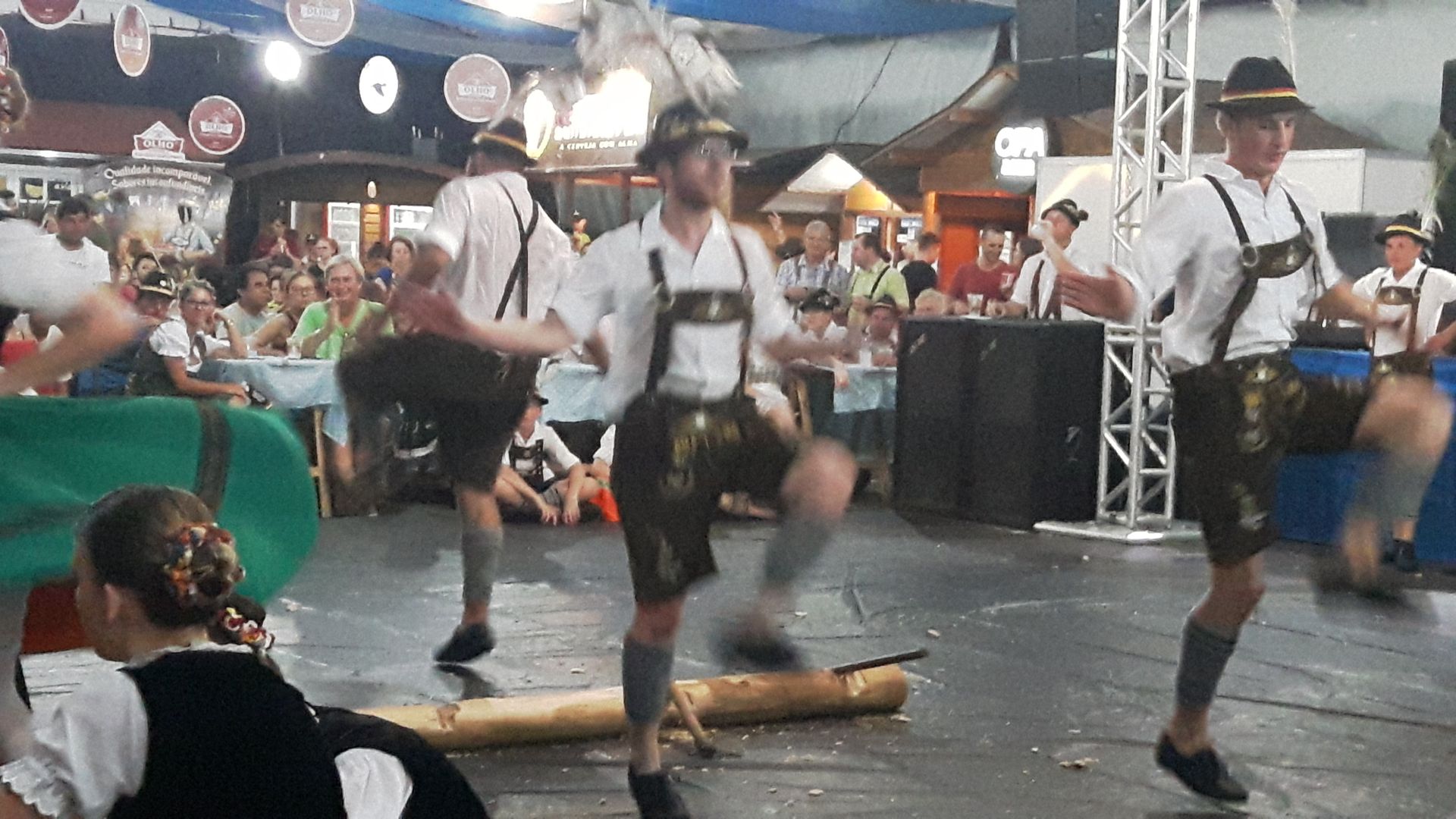

Just like in Germany, where carnival enthusiasts rehearse their comedic speeches and dances throughout the year or decorate their floats or build "Schwellköppe" (carnival heads), there are also associations here that deal with nothing else but the preparation of the 5th and 6th season. And I notice that. There are the loggers, just like the male dancers who tap their thighs vigorously and in rhythm to the music. In addition, there is music from the brass bands - just like in Rosenheim or Bayreuth.
But they are speaking Portuguese to each other!!
A scenario unfolds before my eyes:
I transport myself back to the 1960s, when Germany desperately needed 'guest workers'. That's exactly what the Brazilian Emperor Pedro did in the mid-19th century. I further imagine that our new neighbors come from northern Spain or Italy and are sent to the structurally weak areas. They settle there, start small and medium-sized businesses, create economic power and jobs. This leads to Germans being attracted to work there. And now the comparison: they are only handed an employment contract if they can speak Spanish or Italian... they submit, adapt to the Spanish and Italian culture, learn to dance flamenco, or cook spaghetti or pizza recipes or paella...
In a documentary on YouTube, a German-Brazilian summed it up: I had a black guy who laid the tiles for me. Of course, he had to speak German, otherwise he wouldn't have gotten the job. He wouldn't stand a chance here...
Oh my goodness! the reporter exclaimed.
Incidentally, the summer festival is celebrating its 60th anniversary. In 1959, Pomerode gained its independence and has not belonged to Blumenau since then.
Back to the present:
Today is dedicated to the blog. So many impressions, so many thoughts. The diary is a necessity of life for me. I have to write down the experiences and encounters, otherwise I would suffocate and soon not know where I experienced something and where I thought something.
What a shame, anyone else in my situation might think. He could do that later. Sit in his little room and write blogs. While life is "raging" outside. Why is he taking this tour? To write blogs? Yes - these thoughts also come to me from time to time. But I notice the feeling of suffocation when I can't twist the keys of my laptop.
So after a well-deserved siesta, it is already 5 pm again when I leave this Pousada. I am driven to the immigrant houses, which have been refurbished for a museum. Of course, they close at 5:00 pm and are closed. I sit on the steps of one of the porches and look out over the surrounding garden. I mentally calm down and arrive in the present. Look, look, listen to the sounds, observe the light - always with the feeling: where am I? I remember my trip with Heiko and Eddo to Gdansk, our trip to Wroclaw. I no longer feel like I am in Bavaria now.
On my scooter ride, I pass through a valley. On the slopes, I see architectural styles that I know from home but have also encountered them in Poland. Then I remember Kufstein, Thiersee, Bavaria. I pass a sawmill, of which there are many in the Kufstein region - and not only there - and I see church towers with small churches and cemeteries on the slopes. The afternoon light gives the whole scenery something special. The green of the mowed or grazed meadows appears more intense, the colors of the houses more striking, and then there are the small settler houses. They are inhabited. Old sheds, which hide behind them - perhaps slightly ashamed of their condition - are needed for wood and coal. That in turn reminds me of East Frisia. And again, constantly the question: where am I here? South America is sooo far away! Little Germany - I read on posters that advertise for the European valley. It is the Germans who were driven out of their native homeland. It is they who carry the enemy image of the victorious powers within them.
And yet - seduced by the beautiful afternoon mood - I imagine what it would be like to live here. Nature is still pristine - at least for my eye - here I could buy a small settler house, persuade Eddo and Heiko to a different way of life. They are dreams that show me what images are growing inside me. Against the background that a new phase of life is about to begin for Heiko... but also thinking of Karin and my present.
I turn left at the next opportunity. This is where the new life of the immigrants began. I continue driving and soon come across a gravel road. On both sides of me, I encounter wooded slopes, but only a few meters away, I see cornfields. Maybe not many and certainly not intended for industrial consumption - but there could be more.

Wooded slopes. A lot of land. A lot of space. A lot of peace.
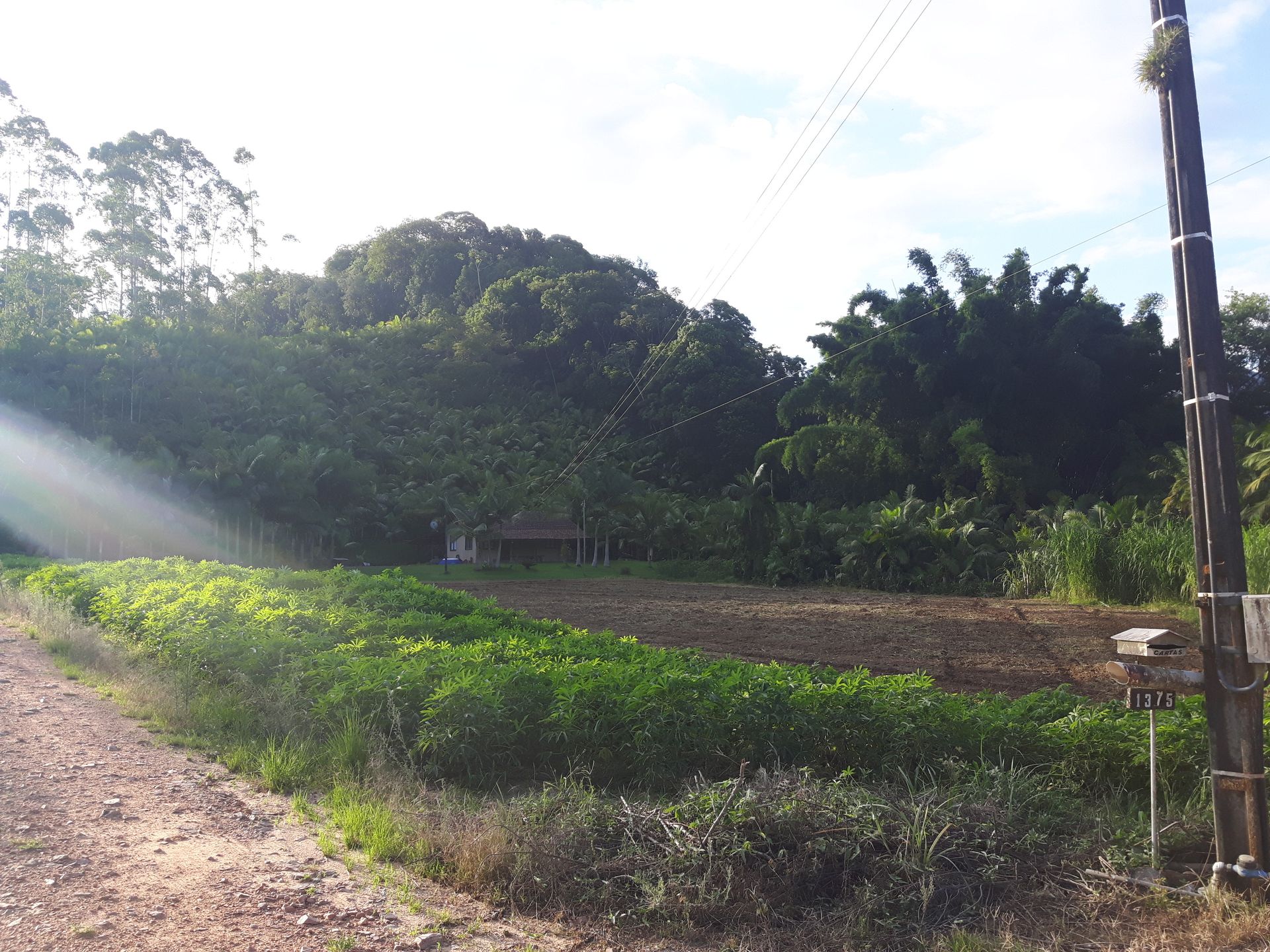
A freshly plowed field in the afternoon light

A small cornfield - only for private use
I drive back towards Pomerode when I come across a poster with a Beetle from the 1950s. I turn back. The workshop is closed, but - as I later find out when accessing their website - they sell spare parts for Beetles, Variants, and Bullys of all years at a decent price. A somewhat illegal business idea, which is only given a short existence, flickers up. I ask the Beetle restorers in Ritterhude which parts they need. I bring them along... whether it's the accelerator pedal, which is not a pedal but a roller, whether it's the hold straps for the passengers, which are attached above the door posts, whether it's the shifting arm or the steering wheel with the Wolfsburg logo in the center... it will certainly remain just an idea.
I then make another stop at a small church. It is open and provides a sense of community. The painted decoration appears somewhat kitschy to me, but the measure of all things here is the community. I visit the cemetery, which at first glance looks quite matter-of-fact. It is not protected by large trees. It is exposed to the South American midday and evening sun. I look at the tombstones, read names that sound German, calculate respectable years of life, and come to the graves that are smaller. They lie next to each other and give the impression that there are many of them. Here lie babies and children who have experienced only their day of birth or only their first years. One death date catches my attention, which bears the date of December 25th. What a stroke of fate!
The annoying cobblestones remind me that I am back in the area of Pomerode. The potato salad from lunch today is nagging at my throat and longing for a draft beer. The sky is clouding over. It could rain and there might be a thunderstorm. I park the scooters at my Pousada Max and am sitting a little later in a beer garden with my e-reader and Sebastian Fitzek. The Pomerodians are recovering from the strains of the weekend. There's nobody here. So I can immerse myself in the world of psychopaths and forensic pathologists without a guilty conscience.
My conclusion of this day: I enjoy traveling with myself.
23.01.:
The bells of the nearby church wake me up at 6 am. What a beautiful sound!
The temperature has been behaving well in the last few days. But now it's back to 36 to 37 degrees today. With the rising temperatures, the energy level drops.
Read, write, sleep. Tomorrow I will continue southwest into the mountains to Rio do Sul, which suffered from severe flooding last September. The hotel prices there are more than reasonable! Just under 20 euros for one night with breakfast and WiFi!!
But how does Pomerode make its money? Over 50 thousand people have to make a living. And just as the town presents itself, it must have considerable tax revenues.
There has been a zoo here since the 1930s, there is a theater, in addition to the fair hall there is also a cultural pavilion, and there are the means to keep the town in good condition. The garden facilities are well maintained, the streets are without potholes, and the sidewalks are without trip hazards, and there are always eye-catchers to beautiful facades.
Unlocking the secret, three major players in the industry: Bosch Rexroth has been based here since the 1950s, building pumps for oil production. And it employs about 400 people. Petrobas is said to be its most important customer. An industrial plant manufacturer - family-run - from Upper Franconia, which settled here in the 1970s, employs 600 people, and the third in the trio is the company A. Schmidt, which is engaged in porcelain production. It has been producing here since 1945.
The smaller companies - mainly skilled trades and businesses - are also busy. Celebrations are gladly held here, but work is also done.
Tourism also contributes its bit, and the municipality takes care of it. The Pomerode summer festival, the Oktoberfest, and the Easter festival are celebrated here.
Yesterday morning I cast out my fishing line. I got into conversation with the granddaughter of the pharmacist and showed her my blog. She speaks Spanish quite well, so communication went better than usual. Towards the end of our chat, I told her that I would like to give German lessons here or read from German books to improve the German language skills of the locals and update their vocabulary. If something had come of it...

Loving handicraft
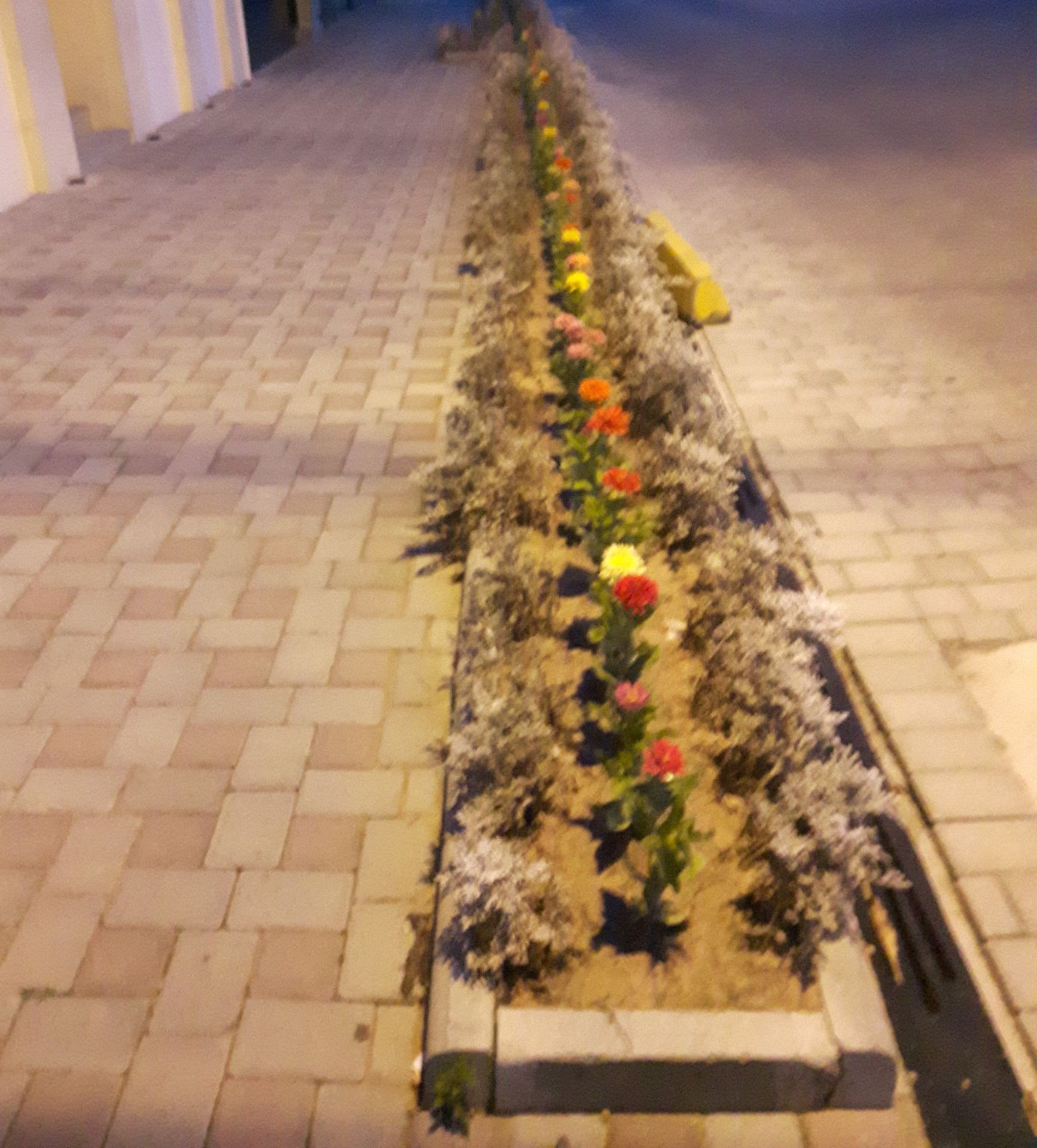
This is not a private front yard. It is "communal property" maintained by her.
In the past few days, I have been constantly confronted with my personal "Germanness". In other words, the improvisations that have accompanied me since my tour - whether it's the first leg or the second leg - I never really realized them for myself. That's just South America. But when something like Pomerode comes along, I become very aware of the deficiency. Like a dried-out sponge, my soul soaks up these positive impressions. Whether it's the individually designed garbage bins on the street, the plant-lined flower beds along the sidewalks or on the traffic islands. Whether it's the artfully crafted handicraft that gives the shops here a name, the roofs that are not covered with cheap corrugated iron but with swallowtails just like in the countryside - my perspective has changed and is reluctant to let go of it.
Where air conditioning units in other cities I have visited have been dripping away and demolishing the base of the houses - here, plastic hoses ensure the controlled flow of the water. The geraniums rejoice at this constant water supply.
Now I am curious to see how big the culture shock will be that awaits me in Rio do Sul.
I should slowly be getting back into South America.
سەبسکرایبی هەواڵنامە بکەن
وەڵام
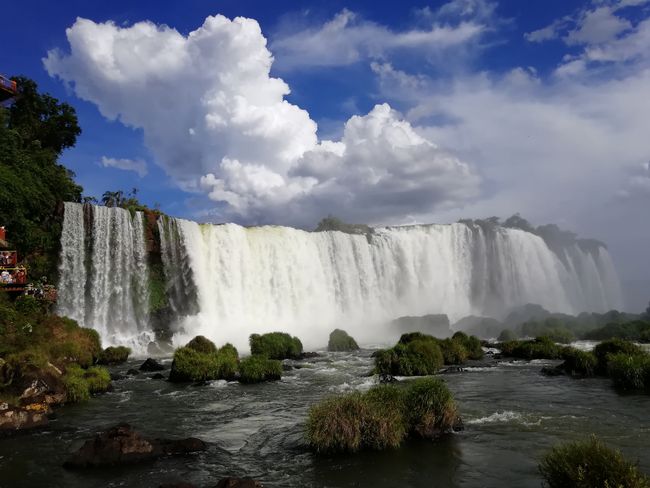
ڕاپۆرتی گەشتیاری بەڕازیل
